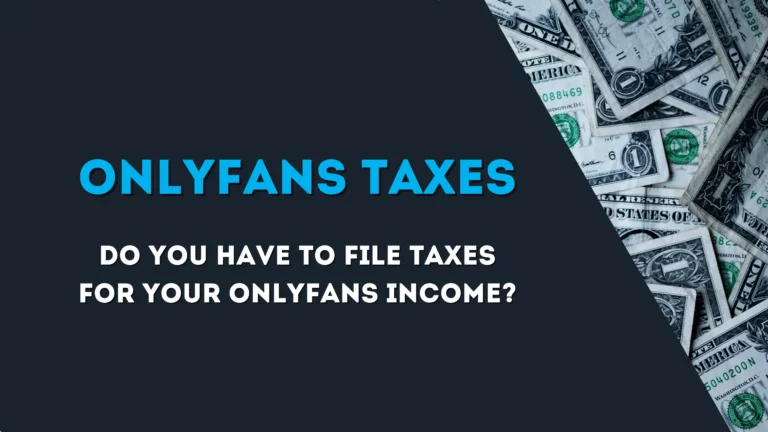OnlyFans Taxes: Everything You Need To Know
In this day and age, OnlyFans has become a profitable platform for content creators, but it also brings tax responsibilities. OnlyFans creators are considered self-employed, receiving gross earnings without tax deductions, making them responsible for managing their own taxes. Proper tax compliance is essential to avoid penalties, ensure professionalism, and prepare for potential audits. As the content creation world evolves, understanding and fulfilling tax obligations is crucial for OnlyFans creators’ success.

OnlyFans taxes: do you have to file taxes for your OnlyFans income?
Introduction
In the digital age, platforms like OnlyFans have emerged as lucrative avenues for content creators. However, with the influx of net income, there arises the inevitable responsibility of understanding and managing OnlyFans taxes. This article delves deep into the intricacies of OnlyFans taxes, offering insights and guidance for creators to navigate their tax obligations effectively.
Understanding OnlyFans Income Tax and How It Works
In the realm of digital content creation, OnlyFans has emerged as a prominent platform, enabling creators to monetize their content in unique ways. However, with the potential for significant earnings comes the responsibility of understanding and managing self-employment taxes associated with OnlyFans income.
OnlyFans as a Platform for Self-Employed Individuals

OnlyFans, at its core, operates as a platform that allows creators to sell content directly to their fans. Whether it’s videos, photos, or other forms of digital content, subscribers pay a fee to access exclusive material. This business model means that creators are essentially running their own businesses. They are self-employed individuals, responsible for managing their gross income and expenses.
Being self-employed on OnlyFans is different from being an employee at a traditional job. Instead of receiving a regular paycheck with income taxes already deducted, OnlyFans creators receive their earnings gross, without any tax deductions. This setup places the responsibility on the creators to set aside a portion of their earnings to cover their tax obligations. The self-employment tax, which covers Social Security and Medicare in the U.S., is one such obligation that creators need to be aware of. Additionally, depending on their total OnlyFans income, creators might also owe income taxes.
Importance of Income Tax Compliance for OnlyFans Creators
Tax compliance isn’t just about fulfilling a legal obligation; it’s about safeguarding one’s financial future and reputation. For OnlyFans creators, understanding and meeting tax obligations is crucial for several reasons:
Avoiding Penalties and Interest: Failing to pay the correct amount of taxes or missing deadlines can result in hefty penalties and interest charges. Over time, these can accumulate, leading to significant financial burdens.
Professionalism: Just as creators invest time in producing quality content, they should also prioritize managing their finances professionally. Proper tax compliance reflects a creator’s commitment to their business and their subscribers.
Preparation for Audits: While audits are rare, they can happen. Being compliant ensures that if the IRS or another tax authority reviews a creator’s finances, everything is in order.
Financial Planning: Understanding tax obligations allows creators to plan better for their financial future. By setting aside funds for OnlyFans taxes, they can avoid unexpected financial strains.
While OnlyFans offers a unique and lucrative opportunity for creators, it also comes with responsibilities. Tax compliance is one such responsibility that, when managed correctly, ensures that creators can focus on what they do best: creating content and engaging with their fans.
What Taxes Do OnlyFans Creators Have To Pay?

OnlyFans creators are typically subject to income tax and self-employment tax. In the U.S., the self-employment tax is comprised of the Social Security tax at 12.4% and the Medicare tax at 2.9%, summing up to 15.3%. This rate mirrors the FICA tax that’s taken out from the paychecks of those with traditional employment.
The specific tax rates and thresholds depend on the creator’s country of residence. For instance:
US: Creators earning more than $600 annually need to file and pay taxes.
UK: Those who earn over £12,500 are required to file taxes.
Canada: All self-employed individuals must file taxes, with specific rates and forms applicable.
Tax Forms for OnlyFans Creators
Depending on your jurisdiction, various tax forms are relevant to OnlyFans creators:
W-9: This form is a request for the Taxpayer Identification Number and Certification.
1099 NEC: This form pertains to nonemployee compensation, helping creators understand their gross business income.
Schedule C (Form 1040): This form is for reporting gross income, business expenses, and calculating net income.
1040 Schedule SE: This form helps in calculating self-employment tax based on net income.
Tax Deductions and Write-offs for OnlyFans Creators
Understanding deductions is a crucial aspect of managing your OnlyFans taxes. By leveraging these deductions, creators can significantly reduce their taxable income, leading to potential savings when it’s time to pay taxes. However, it’s essential to differentiate between business and hobby activities and to be aware of the common tax write-offs available.
Distinction between Business and Hobby for Self-Employment Tax Purposes

The Internal Revenue Service (IRS) makes a clear distinction between business and hobby activities. A business activity is primarily carried out to earn business income or profit, whereas a hobby is done mainly for recreation or pleasure. The distinction is vital because the deductions available for business activities are more extensive than those for hobbies.
For OnlyFans creators, this means that if you’re treating your OnlyFans account as a business, intending to earn a profit, you can claim a wider range of deductions. On the other hand, if the IRS deems your activity as a hobby, your deductions might be limited, and you might not be able to offset your hobby expenses against other income.
Common Self-Employment Tax Write-offs
OnlyFans creators, like other self-employed individuals, have access to a variety of tax write-offs that can reduce their taxable Onlyfans income:
Equipment: Cameras, lighting, microphones, and other tools used to produce content can be deducted.
Internet Bills: A portion of your monthly internet bill, especially if you use your connection primarily for OnlyFans content creation and promotion.
Travel Costs: If you travel for shoots or collaborations related to your OnlyFans business, these costs can be deducted.
Platform Fees: OnlyFans takes a percentage of creators’ earnings as a fee. This expense is tax-deductible.
Specific Clothing: Costumes or specific clothing items purchased exclusively for content creation can be deducted.
Promotional Tools: Business expenses related to advertising, promotions, or any tools used to boost your OnlyFans presence.
Rent: If you use a portion of your home exclusively for content creation, you can deduct a part of your rent or mortgage interest.
Makeup: Makeup purchased and used exclusively for OnlyFans content can be considered business expenses.
Commissions: If you pay commissions to other creators or collaborators, these are deductible.
Other Business Expenses: Any other expenses directly related to your OnlyFans business, such as editing software, props, or background sets.
What You Can’t Deduct From Your Income
Here are some expenses that are considered strictly personal and can’t be written off for OnlyFans taxes:
Tanning Services: Even if you believe it enhances your appearance for your content, tanning services are considered personal.
Hair Removal Services: This includes any treatments like waxing or laser hair removal.
Haircuts and Styling: Regular hair maintenance is not deductible.
Makeup: Everyday makeup, even if used for content, is considered personal.
Personal Trainers: Even if they help you maintain a physique for your content.
Clothing: General clothing, even if worn in your content, is not deductible.
Gym Memberships: Even if you produce fitness content.
Supplements: Any health or fitness supplements.
Nail Care: This includes manicures and pedicures.
Teeth Whitening or Dental Work: Even if it’s for improving your on-camera smile.
Botox or Lip Fillers: Cosmetic procedures are typically not deductible.
Skincare Products: General skincare, even if it enhances your appearance for content.
Facials: Any kind of facial treatments.
Tattoos: Even if they are shown in your content.
Breast Implants: With very specific exceptions, these are not deductible.
It’s important to note that these items are considered “personal expenses” because they provide benefits outside of work as well. There are, however, certain exceptions and workarounds. For instance, if you’re being paid to test, model, or review a product or service, it can be written off. Similarly, pre-shoot preparations for an official shoot, like hairstyling or makeup, can be deducted. Another potential workaround is maintaining a separate makeup collection exclusively for work.
Importance of Maintaining Records and Receipts for Deductions

For every deduction claimed, it’s imperative to maintain detailed records and receipts. These documents serve as evidence of the business expenses, should the IRS or any other tax authority question them. Keeping organized records not only ensures that you’re claiming legitimate deductions but also prepares you in the event of an audit.
Furthermore, regular record-keeping can help OnlyFans creators track their expenses and understand their business’s financial health. Using accounting software or even simple spreadsheets can be beneficial in this regard.
Understanding and leveraging deductions can significantly benefit OnlyFans creators. By reducing taxable income, creators can potentially save a considerable amount in self-employment taxes. However, it’s essential to be aware of the rules, maintain proper records, and consult with a tax professional to ensure compliance with tax regulations.
Filing Process and Deadlines
Navigating the tax landscape can be daunting, especially for OnlyFans creators who might be new to the intricacies of self-employment taxes. Understanding the filing process and being aware of crucial deadlines is essential to ensure compliance and avoid potential penalties.
Quarterly Tax Payments for U.S. Residents
For many U.S. residents, the concept of paying taxes annually in April is familiar. However, when you’re an OnlyFans creator or any self-employed individual, the Internal Revenue Service (IRS) expects you to make quarterly tax payments. This system is based on the idea that taxes should be paid as income is earned.
Instead of paying your entire tax bill once a year, the IRS requires self-employed individuals to estimate their income taxes and self-employment taxes for the year and pay a portion of this estimate each quarter. These payments are typically due on April 15th, June 15th, September 15th, and January 15th of the following year. It’s essential to mark these dates and ensure timely payments to avoid interest and penalties.
Deadlines for Tax Payments and Form Submissions
While quarterly payments cover estimated OnlyFans taxes, OnlyFans creators still need to file an annual tax return. This return reconciles the quarterly payments with the actual tax liability. For most individuals, the deadline to file taxes is April 15th. However, if you owe more taxes than you’ve paid through your quarterly estimates, the balance is due by this date as well.
In addition to the regular tax return, there are specific tax forms that OnlyFans creators might need to submit. For instance, the Schedule C (Tax form 1040) for reporting income and expenses, and the 1099-NEC, which OnlyFans may send to creators detailing their earnings for the year. Being diligent about keeping track of these forms and understanding their submission deadlines is crucial.
Consequences of Not Paying Taxes on Time

The consequences of not meeting self-employment tax obligations can be severe. If you fail to make quarterly tax payments or don’t pay enough through these estimates, the IRS can charge interest and penalties on the underpaid amount. The longer the delay in payment, the higher these charges can become.
Furthermore, not filing a tax return by the deadline can result in a failure-to-file penalty. This penalty is typically 5% of the unpaid taxes for each month or part of a month that a tax return is late.
If the IRS determines that there’s a significant discrepancy between reported self-employment income and actual earnings, or if they suspect intentional evasion of tax obligations, they can conduct an audit. This process can be lengthy, stressful, and may result in additional taxes owed, along with penalties.
In extreme cases, consistent failure to pay taxes or fraudulent reporting can lead to criminal charges. While this is rare, it underscores the importance of staying compliant with tax regulations.
While the world of self-employment taxes and filings might seem overwhelming, staying informed, organized, and proactive can make the process manageable. OnlyFans creators, like all self-employed individuals, have a responsibility to understand their tax obligations and ensure timely compliance.
How to File My OnlyFans Taxes
Navigating the tax landscape for OnlyFans can be intricate, but with the right knowledge, it becomes manageable. In summary of this article, here’s a step-by-step guide to help you file your OnlyFans taxes:
Understand Your Income Source: OnlyFans operates as a platform where creators earn through subscriber payments, tips, and other revenue forms. This income is considered self-employment income, and you’re responsible for both income and self-employment taxes.
Gather Essential Tax Forms:
1099-NEC Form: If you earn more than $600 from OnlyFans, you’ll receive this form, detailing your earnings for the tax year.
Schedule C (Form 1040): This form is for reporting your OnlyFans business income and expenses.
Schedule SE (Form 1040): Use this to calculate the self-employment tax based on your net earnings.
Determine Your Deductions: As an OnlyFans creator, you can write off certain “ordinary” and “necessary” expenses related to your business. These can include equipment, internet fees, content accessories, OnlyFans platform fees, and more. However, personal expenses like tanning services, regular haircuts, and general clothing aren’t deductible.
Decide on Payment Frequency: If you anticipate owing $1,000 or more in taxes for the year, consider making quarterly estimated tax payments. The IRS expects these payments on April 15th, June 15th, September 15th, and January 15th of the subsequent year.
Stay Organized: Regularly track your income, expenses, and maintain receipts. This not only ensures you claim legitimate deductions but also prepares you for potential audits.
Seek Professional Help: If you’re unsure about any aspect of your OnlyFans taxes, consult with a tax professional. They can provide guidance tailored to your specific situation and ensure you remain compliant with tax regulations.
By understanding your tax obligations and staying organized, you can ensure timely compliance and focus on your primary goal: creating content for your fans.
Conclusion
Understanding and fulfilling tax obligations as an OnlyFans creator is essential. It not only ensures legal compliance but also fosters trust among subscribers. As the world of content creation continues to evolve, staying informed and proactive about tax responsibilities will set creators up for success.
FAQs about OnlyFans Taxes
Should I pay taxes for my OnlyFans business?
Yes, if you earn income through OnlyFans, it’s considered taxable income. Just like any other form of income, you are required to report it and pay the appropriate taxes based on your jurisdiction and total earnings.
Does OnlyFans deduct taxes from earnings?
No, OnlyFans does not deduct taxes from creators’ earnings. Unlike traditional employment where taxes are often withheld from paychecks, OnlyFans provides creators with their gross earnings. This means that creators are responsible for setting aside a portion of their income to cover their tax obligations. As self-employed individuals, they must manage their own income and expenses, ensuring they meet their tax responsibilities.
What does the OnlyFans tax form look like?
For US-based creators, the primary tax form associated with OnlyFans earnings is the 1099-NEC. This form details the nonemployee compensation, helping creators understand their gross business income for the year. It’s essential for creators to be familiar with this form as it provides a breakdown of their annual earnings from OnlyFans, which will be crucial when filing their taxes.
Do I need an OnlyFans W2 form?
No, OnlyFans creators do not receive a W2 form because they are not considered employees of OnlyFans. Instead, they are viewed as self-employed individuals running their own businesses. As such, they receive a 1099-NEC form, which reports their earnings for the year. The W2 form is typically reserved for traditional employees, detailing wages, tax withholdings, and other compensation-related information.
Can You Use OnlyFans as a Tax Write-Off?
Yes, you can use OnlyFans-related expenses as business deductions if OnlyFans is your full-time business activity. This includes deducting costs such as props and video equipment from your taxable income. To properly claim these deductions, ensure you maintain accurate records of all business-related expenses.
How Do I Get Tax on OnlyFans?
If you earn more than $600 in a year through OnlyFans and are a U.S. resident, OnlyFans will send you a 1099 NEC form for tax purposes. If your earnings are less than $600, OnlyFans won’t send you a 1099 form, but you are still required to report any income made on the platform to the IRS in your annual income tax return.
What is the Average Salary for OnlyFans?
The average salary for OnlyFans creators varies widely. Over 2.1 million creators are on the platform, with earnings ranging from supplemental income to millions per month. The average OnlyFans creator earns between $150 to $180 monthly. The top 1% of earners on the platform capture 33% of the total revenue. Top earners typically have large existing audiences, produce niche content, utilize high-quality materials, and engage in aggressive marketing strategies.
How much tax is owed for OnlyFans income?
The amount of tax owed for OnlyFans income depends on several factors, including the creator’s total income, their expenses, and the specific tax rates in their jurisdiction. In the U.S., for instance, OnlyFans creators are subject to both income tax and self-employment tax. The self-employment tax comprises the Social Security tax (12.4%) and the Medicare tax (2.9%), totaling 15.3%. Additionally, the specific income tax rate will vary based on the creator’s taxable income after deductions. It’s also worth noting that tax rates and thresholds can differ for creators based in other countries, such as the UK or Canada.
Will OnlyFans appear on my taxes?
Yes, earnings from OnlyFans should be reported on your taxes as it’s a source of income. Given that OnlyFans operates as a platform allowing creators to monetize their content, the income generated from subscribers, tips, and other revenue streams is considered self-employment income. As such, it’s essential for creators to report this income on their tax returns, ensuring they remain compliant with tax regulations and avoid potential penalties.
Navigating the Technicalities and Essentials of Online Platforms
- Implementing Video Chat on OnlyFans: Understand how to incorporate video chat functionality into your OnlyFans page. This article covers the technical setup, engagement strategies, and benefits of live video interactions with fans.
- Building a White-Label Social Media Platform: Discover the steps to create a white-label social media platform. Learn about customization options, branding, and essential features for a successful social networking site.
- Choosing the Best White-Label Community Platform: Explore the top white-label community platforms available. This guide reviews various options, comparing their functionalities, customization capabilities, and user experience.
These articles offer in-depth knowledge and practical advice on various technical aspects and important considerations for creators and entrepreneurs managing online platforms.
After diving into the intricacies of OnlyFans taxes, consider exploring more articles from our blog:
